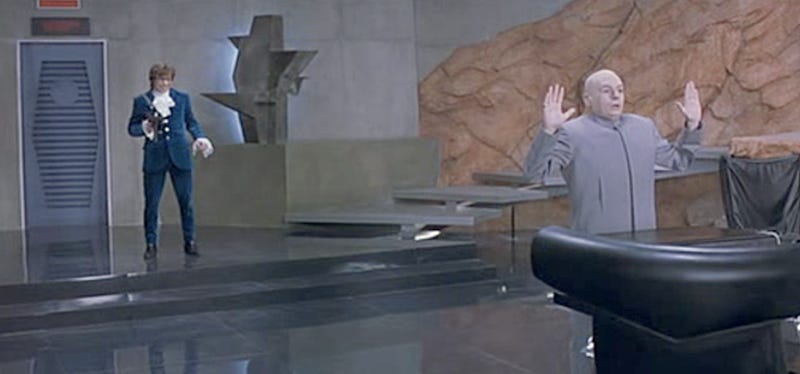Miami and Portland have the same problem
Neither one has the power to give the other what they want.
“We’re not so different, you and I.”
On its face, you could not find two NBA markets more different than Portland and Miami. The black and red color schemes are about the only things the same on the surface. But there are many things that connect the franchises when you look under the hood. Stu Inman, one of the architects of the 1977 Blazers, but who is likely more well-known as the man who passed on Michael Jordan, was Miami’s first Director of Player Personnel. Jack Ramsay, for years, was a color commentator on Heat broadcasts. There is, of course, the Erik Spoelstra connection. And now, Damian Lillard’s demand to be traded to the Heat.
And two weeks after the formal trade request, it’s clear that neither the Heat nor the Blazers currently have the ability to accomplish what the other wants without sinking their own battleship.
On the Portland side, a package centered on Tyler Herro only exacerbates their current predicament: being loaded with backcourt talent and light on frontcourt talent.
Being stuck trying to deal with their excess backcourt talent, but with less overall talent to potentially extract value in a trade, agreeing to Miami’s preferred deal is a non-starter. It’s not unlike the situation they have been dealing with, which Sean Highkin has smartly referred to as “The Dame Tax,” with teams knowing their backlog of backcourt talent makes it imperative to unload some of it to make the team more balanced, thus making a trade harder to pull off.
It would only be worse with Herro and Portland’s young backcourt talent of Scoot Henderson, Anfernee Simons, and Shaedon Sharpe. All you’re doing is lowering the overall quantity of talent while making it harder to make a good deal down the line.
As for Miami’s inability to get what they want, there’s been a lot of noise about the Lillard to Miami trade, resting on 3rd and 4th teams giving up assets for Herro. Yet two weeks since Dame’s trade request become official, with most of the league’s rosters set, no such team has emerged. It’s much easier for a team to say “yeah, we’re interested in Tyler Herro if we are getting him while only unloading players we don’t like and no picks” than it is for one of those teams to actually give something up that makes the trade workable for Portland’s desires and the Heat’s necessity to satisfy the Stepien Rule, which stipulates you are not able to trade first-round picks in back-to-back years.
And while there have been many hypothetical teams floated in media reports as potential 3rd and 4th teams for Herro, if those teams were willing to give up the value needed to make all sides happy, why are we two weeks removed from the trade request and there is still no deal? Herro was effectively on the table all summer last year for Donovan Mitchell and that deal didn’t get done. It’s not Herro’s fault that the Heat want to trade him to a team with too many guards, but that basketball truth remains Miami’s problem. One that Portland is under no obligation to go out of its way to solve, just like the Heat are under no obligation to bid against themselves when Lillard’s agents have made it clear he wants Miami.
And that’s why both sides remain at a stalemate. They’re both looking to get an ideal outcome from the situation, yet neither has the ability to get what they want without overextending themselves. For instance, Dame loves Caleb Martin. Without Max Strus, Martin is more important than ever to the Heat.
And Portland is well within its rights to ask for Martin, or ask Miami to use Martin’s contract in a trade, to extract the draft capital they desire. But it seems like neither Miami nor Lillard want that and so the staring contest continues. Not to mention that Martin has a player option for next season and could look to cash in on his playoff success, thus leaving Portland (or the hypothetical 3rd or 4th team) holding the bag to overpay him, something it seems Joe Cronin would want to avoid in an even more prohibitive luxury tax environment.
Many teams also look at Lillard’s contract in his later years as prohibitive, according to Woj, but the same market also looks at Tyler Herro as someone who is grossly overpaid for his services. Not to mention Herro seems to love the South Beach lifestyle. For as much talk as there has been about a disgruntled Lillard, would a trade for Herro result in the very scenario people have cautioned about Lillard, with that team acquiring an unhappy player? Except this one isn’t an NBA Top 75 talent.
And so the offseason goes, not unlike the current situation in Philadelphia with James Harden, or last year’s situation in Brooklyn with Kevin Durant, with nothing happening.
Almost every angle of this trade request has been exhausted, but it has mostly ignored the simplest truth of the situation: the Blazers and the Heat are stuck with the same problem. Neither can give the other one what they want.
They aren’t so different, Miami and Portland.



